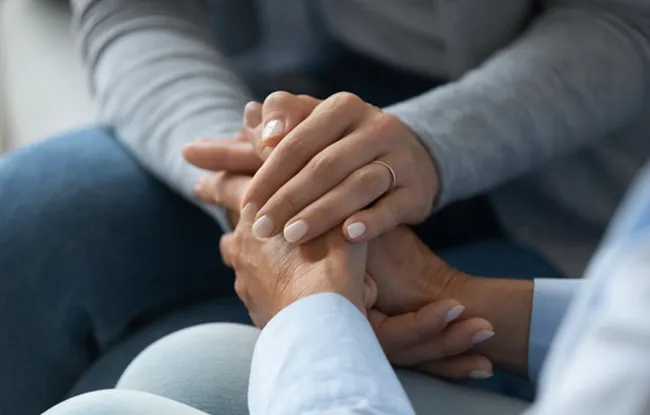- Home
Cancer: don't forget about caregivers

One in ten French people helps a person with cancer. It means that about five million people take on the role of "caregiver" every day. The caregivers at Institut Curie are always attentive to the needs of these people whose lives have also been turned upside down.
A loved one, a spouse, a brother or sister, a child... The caregiver of a patient is the person who, as the disease progresses, provides moral support coupled with essential help in practical and daily life. Defining a caregiver is not an easy task as it covers various profiles and situations.
Claire Llambrich-Molines nurse at Institut Curie
Caregivers, an essential role for patients
The results of a major survey of the Societial Cancer Observatory, which was set up as part of the Cancer Plan under the aegis of the Ligue contre le cancer and published with the support of the Macif Foundation, point out that caregivers also ask to be helped. "Every day, these caregivers accompany their loved ones, whether they are family members or not,” the study continues, detailing the categories of tasks they undertake.
- Moral support for 61% of the respondents (listening, presence, company during leisure time).
- Support throughout the care journey for 37% (setting up medical appointments, managing medical and administrative records, being involved in the care regimen).
- Domestic help for 36% (meals, shopping, housing maintenance, organizing the daily routine).
- Daily activities for 32% (bathroom regimen, dressing).
In the short term, the development of outpatient medical care will further increase the need for attendance, support, and help at home.
Agnès patient at Institut Curie
Indeed, becoming a caregiver is not without consequences for the life course of this person. Institut Curie is well aware of these legitimate needs and thus offers various courses of action to patients and their loved ones.
Dr Carole Bouleuc Head of the Interdisciplinary Support Care Department (Disspo) at Institut Curie
Information, guidance, and listening
- The Meeting and Information Area (Espace Recontre Information ,ERI) and the Patient Center (Maison des patients et des proches) are here to welcome, listen to, and guide caregivers. Conference debates on the rights of patients and loved ones are regularly organized. "Each time, we see growing interest from users. They know little about their basic rights and even less about the new opportunities that are provided to them to help them express themselves with regard to their care (the person of trust, the advance directives, etc.)," comments Catherine Naudet, executive at the Disspo.
- Institut Curie has partnered with associations such as Service et Amitie, the ASP-Founder, and Vivre Comme Avant in order to better meet the expectations of patients and relatives.
- Dissemination of "patient information" documents and launch of the myCurie app to better share the information from the medical files and organize appointments
In psycho-oncology
- Consultations adapted to the needs of the family circle of the patient or the person at hereditary risk, in particular, of breast and/or ovarian cancer
- A consultation and a discussion group dedicated to parents of sick children
- Interviews with spouses
In addition
- Institut Curie encourages patients to designate their trusted person at the beginning of their treatment.
- The patient pathway coordination cells (C2P2) organize the discharge from hospital of patients with a complex pathway and provide assistance in making appointments and continuity of care at home or in a nursing home.
- Day hospitalization in palliative care, onco-geriatrics, or in the pain unit can provide caregivers with a few hours of respite. "The patients, who are taken care of by the supportive care and palliative care team, come regularly each day to the hospital for an overall reassessment. During this time, the caregiver, if necessary, is offered an interview with the possibility of continued discussion with a psycho-oncologist for an evaluation,” concludes Dr. Carole Bouleuc, head of the Disspo.

